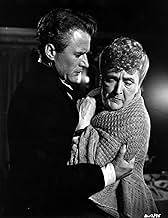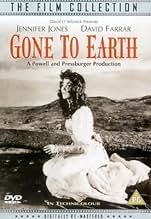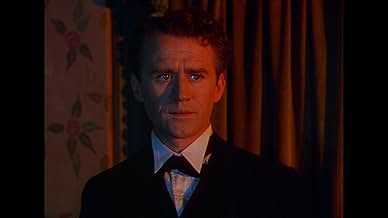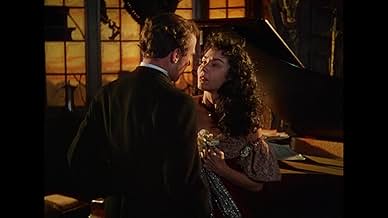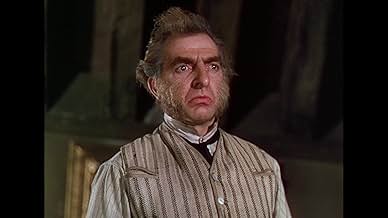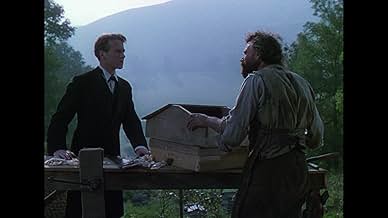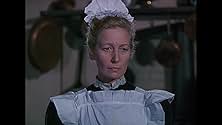VALUTAZIONE IMDb
6,9/10
1639
LA TUA VALUTAZIONE
Aggiungi una trama nella tua linguaA beautiful, superstitious, animal-loving Gypsy is hotly desired by a fox-hunting squire even after she marries a clergyman.A beautiful, superstitious, animal-loving Gypsy is hotly desired by a fox-hunting squire even after she marries a clergyman.A beautiful, superstitious, animal-loving Gypsy is hotly desired by a fox-hunting squire even after she marries a clergyman.
- Regia
- Sceneggiatura
- Star
- Premi
- 3 vittorie e 1 candidatura in totale
Arthur Mainzer
- Chapel elder
- (as Arthur Reynolds)
Recensioni in evidenza
An unlikely co-production between the British Archers production company, comprising Michael Powell and Emeric Pressburger and dictatorial Hollywood mogul David O Selznick, unsurprisingly starring the latter's wife Jennifer Jones, "Gone To Earth" is a visually remarkable and emotionally turbulent feature. Set in the rugged Shropshire countryside, the action centres around Jones' child of nature Hazel Woodus, only daughter of a semi-idiotic harpist father. Uneducated and wilful, Hazel is a dark haired beauty of wild, gypsy appearance and along with her unusual, instinctive relationship with animals, in particular, a stray fox she has adopted, is obviously set quite apart from the rest of the God-fearing village community where she and father eke out an existence.
Unwittingly causing havoc in the hearts and I dare say loins of almost every young man she meets, the womenfolk in the neighbourhood have Hazel marked down as a man-baiting temptress. Cast out into the street late at night by the Bible-punching mother of another potential suitor, she falls into the path of the brutish and headstrong local squire, David Farrar, who puts her up at his estate for the night, much to the morally-offended chagrin of his attitudinal man-servant Hugh Griffiths.
Later, at a local fair where Hazel sings accompaniment to her father's playing, she comes into the orbit of the new young pastor, Cyril Cusack, who almost immediately falls for her and proposes marriage, which she's bound to accept. However, Hazel has got into the blood of the caddish squire and a tug-of-love ensues over her which in the end, nobody wins.
I sometimes think these wonderful Archers films should come with a warning, "Abandon reality, all who enter here" as the viewer is transported into a stylised version of the everyday world peopled with highly individual, almost preternatural characters. The Thomas Hardy-esque story abounds with hunting and biblical allegories with Hazel identified both as the elusive fox no huntsman can capture let alone tame and also as an unwitting Eve-like stirrer of passions.
Of course it ends in tragedy but not before the Archers customary blend of sweeping narrative, atmospheric music and stunning colour cinematography has created another notable film almost impossible to categorise. Jones speaks a kind of pidgin-English as she immerses herself in her character, although she's probably most effective when not speaking. She doesn't have to, her dark sexuality and wild strangeness bring the menfolk to their knees anyway. Cusack and Farrar make excellent rivals for her in their different ways, the twin benevolent and malevolent influences on either shoulder of Hazel, speaking in her ear.
I'm no fan of hunting and am fully in favour of the fox-hunting ban in this country but I must admit I was carried along in the chase for Hazel's hand in another brilliant Archers production. As a postscript, singer Kate Bush, who in her youth bore a striking resemblance to Jones' appearance in this film, took inspiration from it for her "Hounds of Love" song.
Unwittingly causing havoc in the hearts and I dare say loins of almost every young man she meets, the womenfolk in the neighbourhood have Hazel marked down as a man-baiting temptress. Cast out into the street late at night by the Bible-punching mother of another potential suitor, she falls into the path of the brutish and headstrong local squire, David Farrar, who puts her up at his estate for the night, much to the morally-offended chagrin of his attitudinal man-servant Hugh Griffiths.
Later, at a local fair where Hazel sings accompaniment to her father's playing, she comes into the orbit of the new young pastor, Cyril Cusack, who almost immediately falls for her and proposes marriage, which she's bound to accept. However, Hazel has got into the blood of the caddish squire and a tug-of-love ensues over her which in the end, nobody wins.
I sometimes think these wonderful Archers films should come with a warning, "Abandon reality, all who enter here" as the viewer is transported into a stylised version of the everyday world peopled with highly individual, almost preternatural characters. The Thomas Hardy-esque story abounds with hunting and biblical allegories with Hazel identified both as the elusive fox no huntsman can capture let alone tame and also as an unwitting Eve-like stirrer of passions.
Of course it ends in tragedy but not before the Archers customary blend of sweeping narrative, atmospheric music and stunning colour cinematography has created another notable film almost impossible to categorise. Jones speaks a kind of pidgin-English as she immerses herself in her character, although she's probably most effective when not speaking. She doesn't have to, her dark sexuality and wild strangeness bring the menfolk to their knees anyway. Cusack and Farrar make excellent rivals for her in their different ways, the twin benevolent and malevolent influences on either shoulder of Hazel, speaking in her ear.
I'm no fan of hunting and am fully in favour of the fox-hunting ban in this country but I must admit I was carried along in the chase for Hazel's hand in another brilliant Archers production. As a postscript, singer Kate Bush, who in her youth bore a striking resemblance to Jones' appearance in this film, took inspiration from it for her "Hounds of Love" song.
A beautifully made and gently rolling film, almost surreal in content.
Some moments almost seem off cue and through a breathtakingly simple narrative visual style, comes a story of innocence, passion and ultimate tragedy. The music is hypnotic and compliments the flow of the film.
Superb performance by all - including 'Foxy'! If this film was made today it would be showered with Oscars.
Finally, it is hard to see a comparable style in the British film industry prior to this and certainly nothing after it. It is this fact that I believe contributes to the films unique qualities.
Some moments almost seem off cue and through a breathtakingly simple narrative visual style, comes a story of innocence, passion and ultimate tragedy. The music is hypnotic and compliments the flow of the film.
Superb performance by all - including 'Foxy'! If this film was made today it would be showered with Oscars.
Finally, it is hard to see a comparable style in the British film industry prior to this and certainly nothing after it. It is this fact that I believe contributes to the films unique qualities.
I believe I saw this movie perhaps 50 plus years ago, as a young man. It must have been in the mid 1950s or around then. I found Jennifer Jones to be a marvelous actress in this movie and found that to be true in other movies she starred in. But I was overwhelmingly struck with the beauty of the Shrophire countryside which to some extent was almost as much of an attraction to me as Jennifer Jones. I have searched for a long time for this movie...but all I could truly remember of it , with the obvious exception of Miss Jones, was the scream or shout at the end of it ----Gone to Earth. I only know have found out what the meaning of that call was. I will be wanting to purchase this movie soon. Don Berghuis
I saw this glorious film when it first appeared. The following week I tracked it down to a small London cinema where they screened single films continuously several times a day without supporting features. I hadn't intended seeing it more than once on this occasion but I can recall being so mesmerised that I watched the programme through three times. Clearly I was out of step with the climate of critical opinion. The reviewers had slated it and the audience around me was distinctly hostile. There was a lot of fidgeting and derisory shouts. Quite a few walked out. Behaviour was often bad in British cinemas in the 'fifties particularly if viewers got bored. The manager called the police in during a screening I attended a few years later of "The Trouble WIth Harry" and I can even remember screaming at the usherettes to stop talking when I first saw "A Face in the Crowd". I had to wait many years before I heard good things being said about "Gone to Earth". It was in 1988 when someone introduced a showing of it on British television most enthusiastically. Whatever one thinks about the relative merits of Powell and Pressburger's films (I am clearly in a minority in thinking this their finest) there is no doubt that they are now appreciated in a way they never were when they first appeared. But if passion for what is still considered one of their minor works may seem rather over the top, let me say but one thing; where else in the whole of cinema is there a more haunting and magical evocation of English landscape! Christopher Challis, a brilliant cinematographer, is the real star of the film. Undoubtedly (and this is perhaps at the core of its original problems) style matters more than content. The plot is little more than Victorian melodrama - lecherous squire deflowers simple country girl who has married local vicar - and the dialogue is curiously stilted. However this hardly matters in a work cinematically choreographed with such brilliance. The final foxhunting sequence, where the film's many strands are brought together, is visually and aurally one of the most spellbinding in all cinema. The huntsman's cry of "Gone to earth!" at the very end has haunted me for well over half a lifetime.
Somehow this film was made without the incessant tinkering for which David O. Selznick was notoriously famous, presumably because he had allowed his wife, Jennifer Jones, to travel to Great Britain and work her magic untrammelled by his day-to-day presence on the set and in the screening room as rushes were viewed. By all reports, however, he was so horrified by what Powell and Pressburger had wrought that what we on this side of the Atlantic were allowed to view bears only a faint resemblance to the intentions of those English artists,
It has been years since I saw, on a television broadcast, a no doubt truncated and heavily reedited version under its U.S. title, "The Wild Heart" but, as I had before, I was amazed at the "Archers" beautiful, almost florid, use of Technicolor and their apparently reckless disregard for the expectations of an audience weaned on American pablum and the more refined output of their English peers of the cinema.
Miss Jones is vibrantly beautiful and endlessly fascinating as she plays Hazel Woodus and it goes without saying that her support from a memorable cast of carefully chosen players, professional and, I would guess, amateur is of an order that one can always confidently expect from the British both on stage and on screen. It's wishful thinking, at this late date, I suppose but a VHS or DVD version, available to us here in the U.S., would be a remarkable addition to a movie-lover's library.
It has been years since I saw, on a television broadcast, a no doubt truncated and heavily reedited version under its U.S. title, "The Wild Heart" but, as I had before, I was amazed at the "Archers" beautiful, almost florid, use of Technicolor and their apparently reckless disregard for the expectations of an audience weaned on American pablum and the more refined output of their English peers of the cinema.
Miss Jones is vibrantly beautiful and endlessly fascinating as she plays Hazel Woodus and it goes without saying that her support from a memorable cast of carefully chosen players, professional and, I would guess, amateur is of an order that one can always confidently expect from the British both on stage and on screen. It's wishful thinking, at this late date, I suppose but a VHS or DVD version, available to us here in the U.S., would be a remarkable addition to a movie-lover's library.
Lo sapevi?
- QuizThe choir was the real choir from the local Methodist chapel. When he heard them singing, director Michael Powell said they were too good and he wanted them to sound "more ragged, like a choir of country folk" only to be told "But we ARE country folk, Mr. Powell."
- BlooperAs Abel and Hazel Woodus come down the hill to the chapel, the mine engine house disappears and then reappears between shots
- Citazioni
Hazel Woodus: The world wasn't made in seven days only for Abel Woodus.
- Versioni alternativeThe reedited and shortened version titled "The Wild Heart" was produced after a disagreement and court case between director Michael Powell and producer David O. Selznick. Selznick's changes are mainly:- (1) Adding a prologue. (2) Adding scenes explaining things, often by putting labels or inscriptions on them. (3) Adding more close-ups of Jennifer Jones (Selznick's wife). He also deleted a few scenes that he felt weren't dramatic enough. Sadly some of these were major plot points so the story doesn't make as much sense as the original. In his autobiographies, Powell claimed that Selznick only left about 35 mins of the original film. In fact there's a lot more than that. About 2/3 of the original remains.
- ConnessioniFeatured in The Late Show: Michael Powell (1992)
I più visti
Accedi per valutare e creare un elenco di titoli salvati per ottenere consigli personalizzati
- How long is Gone to Earth?Powered by Alexa
Dettagli
- Data di uscita
- Paesi di origine
- Lingua
- Celebre anche come
- Cuore selvaggio
- Luoghi delle riprese
- Aziende produttrici
- Vedi altri crediti dell’azienda su IMDbPro
- Tempo di esecuzione1 ora 50 minuti
- Colore
- Proporzioni
- 1.37 : 1
Contribuisci a questa pagina
Suggerisci una modifica o aggiungi i contenuti mancanti


